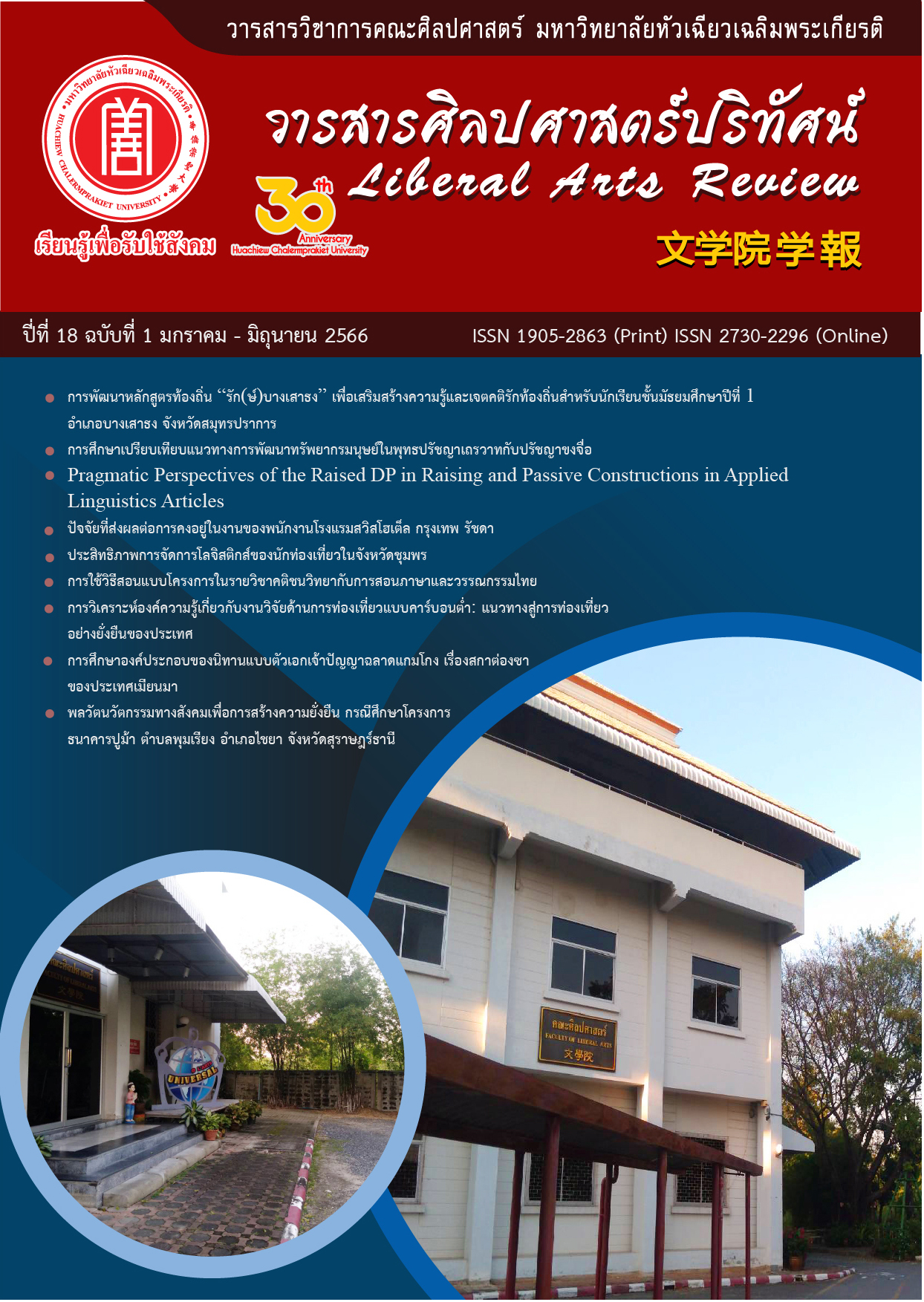Pragmatic Perspectives of the Raised DP in Raising and Passive Constructions in Applied Linguistics Articles
DOI:
https://doi.org/10.14456/lar.2023.3Keywords:
pragmatic perspectives, the raised DP, raising constructions, passive constructions, applied linguistics articlesAbstract
This study examined pragmatic perspectives of the raised DP in raising constructions and passive constructions in English applied linguistics articles. Prior studies selected the materials of English novels, writing of EFL learners and international corpora such as British National Corpus (BNC). This study aims to contribute to the field by examining these pragmatic perspectives in journals of English applied linguistics namely, PASSA Journal, LEARN Journal, and rEFLections. In regard to the data collection, a total of 15 articles, which are made up of 5 articles for each journal, contain 74 sentences of the raised DP in both constructions. The data analysis follows Radford (2009) to select the raised DP in raising and passive constructions. After the process of data analysis, three non-native English linguists were asked to validate the data analysis in order to gain validity and reliability. The results in this study show that 43.24 percent of the raised DP in passive constructions and raising constructions are used for the main reason of topic comment. The results of this study oppose the previous studies which examined materials of English novels, the writing of EFL learners and international corporal where the raised DP is used as the given information. It is expected that the results of this study will be practical and useful for learners of English as a Foreign Language (EFL) and learners of English as a Second Language (ESL) to apply the use of the raised DP in writing academic journals in the field of English applied linguistics accurately and appropriately.
References
Callies, M. (2008). Easy to understand but difficult to use? Raising constructions and information packaging in the advanced learner variety. G. Gilquin, M. B. Diez-Bedmar & S. Papp (Eds.). In Linking Up Contrastive and Learner Corpus Research (pp. 201–226). Amsterdam: Rodopi.
Charoenchaikorn, V. (2022). Effects of post-task anticipation during online collaborative writing in L2. PASAA, 64, 68- 98.
Chinpakdee, M. (2022). Understanding teacher autonomy through EFL teachers’ online Teacher Experiences, rEFLections, 39(3), 586-602.
Clifton, C., & Frazier, L. (2004). Should given information come before new? Yes and no. Memory & Cognition, 32(6), 886-895.
Culicover, P. W., & Jackendoff, R. (2001). Control is not movement. Linguistic Inquiry, 32(3), 493-512.
Grimm, S. (2010). An empirical view on raising to subject. ZAS Papers in Linguistics, 52, 83-109.
Iamsirirak, E. (2022). The development of English grammar for teacher coursebook. reFELections. 29(3). 503-525.
Khamboonruang, A. (2022). Building an initial validity argument for binary and analytic rating scales for an EFL classroom writing assessment: Evidence from many-facets rasch measurement. reFELections. 29(3). 675-699.
Kulprasit, W. (2022). Formative multiple E-feedback in second language writing virtual learning Spaces. PASAA, 64, 52-67.
Lenardič, J. & Ilc, G. (2019). English raising predicated and (non-) finite clauses: diachronic and synchronic perspectives. FLUMINENSIA: časopis za filološka istraživanja, 31(1), 31-59.
Mongkolhutthi, P. (2022). Expatriate native English speaking lecturers in a Thai university context: Privileged or underemployed?. LEARN Journal: Language Education and Acquisition Research Network, 15(2), 326-350.
Nipaspong, P. (2022). The effects of online corrective feedback on university students’ self-regulation in writing. PASAA, 64, 23-51.
Phoocharoensil, S. (2022). ELT and AL research trend in Thai SCOPUS- indexed journal. PASAA, 64, 138-162.
Radford. A. (2009). Introduction to English sentence structure. Cambridge: Cambridge University Press.
Raheem, R. A. (2021). Problems of subject raising constructions among Yoruba ESL Learners. Yoruba Studies Review, 6(2), 1-19.
Sakulprasertsri, K. (2022). Divide ownership, accessibility, and university students’ perception of an online foundation course in Thailand. 63, 123-147.
Sharma, G. (2017). Pros and cons of different sampling techniques. International Journal of Applied Research, 3(7), 749-752.
Sitthirak, C. (2022). Impact of interpersonal relations and positioning on the resolution of conflicts in the EFL classroom. LEARN Journal: Language Education and Acquisition Research Network, 15(2), 751-775.
Sumonsriworakun, P. (2022). A corpus-based investigation of English synonyms: Disadvantage, downside, and drawback. LEARN Journal: Language Education and Acquisition Research Network, 15(2), 649-678.
Supanfai, P. (2022). People or persons?: A corpus-based study. rELFections, 29(3), 621-637.
Swan, A (2016). Practical English usage. Oxford: Oxford University Press.
Tatsuki, D. (2006). What is authenticity. The language teacher, 16(5), 17- 21.
Thienthong, A. (2022). It looks weird to me.’: attitudes towards standard usage and variant use in present-Day English. rEFLctions. 29(3). 550-570.
Thuratham, W. (2022). Individual, pair and group EFL activities for aviation students at a Thai university: A closer look at language achievement and attitudes. LEARN Journal: Language Education and Acquisition Research Network, 15(2), 892-921.
Vathanalaoha, K. (2022) Effects of gamification in English language learning: The implementation of Winner English in secondary education in Thailand. LEARN Journal: Language Education and Acquisition Research Network, 15(2), 830-857.
Wongkittiporn, A. (2022). Pragmatic interpretations of raised arguments in English novels. Journal of Liberal Arts Prince of Songkla University, 14(1), 27-54.
Wongkittiporn, A. (2022). Raised and unraised conditions, semantic interpretations and pragmatic aspects of the verb “seem” in English novels. Liberal Arts Review, 17(1), 77-99.
Downloads
Published
How to Cite
Issue
Section
License
Copyright (c) 2023 Liberal Arts Review

This work is licensed under a Creative Commons Attribution-NonCommercial-NoDerivatives 4.0 International License.
บทความที่ได้รับการตีพิมพ์เป็นลิขสิทธิ์ของวารสารศิลปศาสตร์วิชาการและวิจัย
ข้อความที่ปรากฏในบทความแต่ละเรื่องในวารสารวิชาการเล่มนี้เป็นความคิดเห็นส่วนตัวของผู้เขียนแต่ละท่านไม่เกี่ยวข้องกับมหาวิทยาลัยหัวเฉียวเฉลิมพระเกียรติ และคณาจารย์ท่านอื่นๆ ในมหาวิทยาลัยฯ แต่อย่างใด ความรับผิดชอบองค์ประกอบทั้งหมดของบทความแต่ละเรื่องเป็นของผู้เขียนแต่ละท่าน หากมีความผิดพลาดใดๆ ผู้เขียนแต่ละท่านจะรับผิดชอบบทความของตนเองแต่ผู้เดียว




